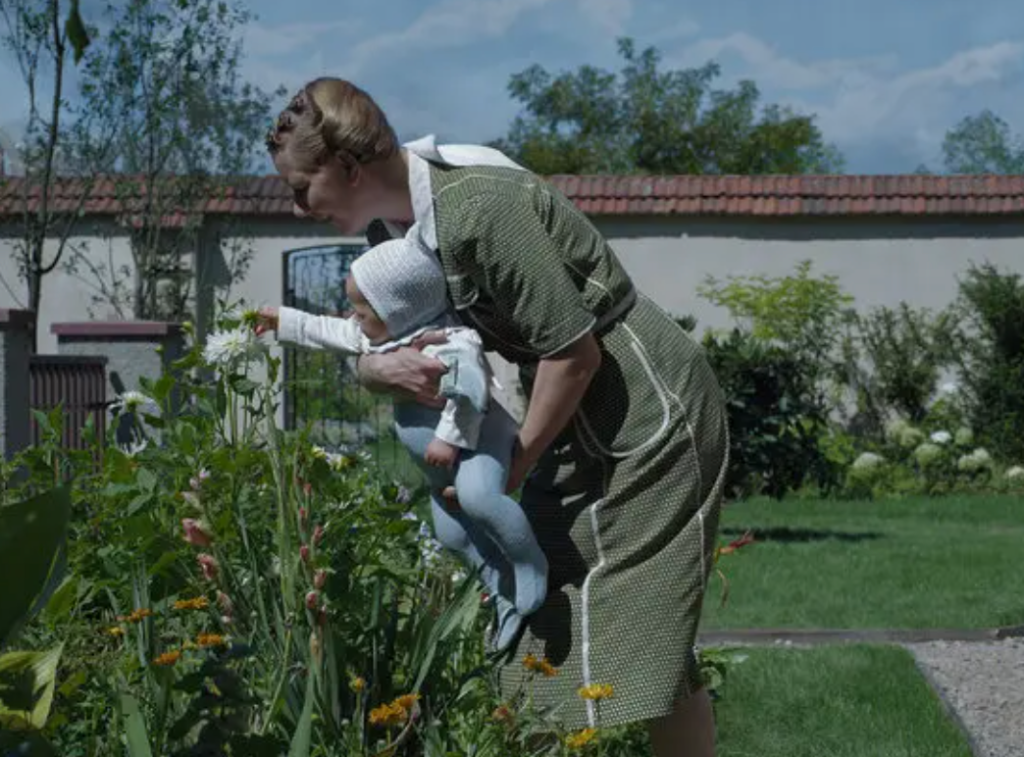
THIS IS THE story of Rudolf Hoss (Christian Friedel): not a name that most people would recognise. He was the business genius who understood all those aspects that make for robust business success: excellent logistics management, inventive strategies, the relentless focus on targets etc. He didn’t come from money; but his outstanding success ensured that he was rapidly promoted through the ranks; he was the envy of his peers, was rewarded handsomely with a wonderful home, replete with servile staff, and he enjoyed a great deal of expense paid, champagne-fueled travel.
And the reasons for all this success? He was the person who figured out how to kill as many Jews as possible by building a gas chamber that never had down time.
He was the Nazi in charge of Auschwitz.
As the movie makes clear, it was just a job (killing people) that he excelled at. This is an examination not so much about the banality of evil, but of its normalisation. We’re introduced to his charming wife, Hedwig (Sandra Huller from Anatomy of a Fall), his gorgeous family (Hoss’ eldest daughter went on to become a leading model in post-war Spain), his fabulous home with its extensive gardens and delightful kids’ plunge pool etc. The family have lovely picnics at the nearby lake; they entertain their colleagues and guests; they’re a tight and loving family. And there’s no need to go far to work: the gas chamber is just across the wall from their home. It belches dark smoke from time to time; occasionally there’s ash (which their gardeners use as fertilizer) and there are deep guttural sounds, more like moans that come from its furnaces.

There’s always a background sound, a sort of low rumble; a constant aural reminder that, as we look on with horror at the life of this happy blonde German family, dad’s in the business of mass extermination. It’s like living next to a train line: you soon get accustomed to it. The movie asks the question, “Just how is that possible?” There is a moment in one of his many boardroom meetings (just like any other boardroom meeting, except in this one the senior executives are all Nazi officers) when Hoss, the acknowledged hero of logistics management, is tasked with ‘disposing’ of 700,000 Jews. They’re about to be shipped in, like new stock, from Hungary. Hoss works out how many trains that would take X the amount of persons/train X time etc. No problemo.
And while dad is wrestling with the logistics of the holocaust, mum is pissed off that his promotion/transfer might require the family to relocate. She’s absolutely not having that. She’s settled there in her large home, proud of her nickname as the Queen of Auschwitz; and there’d be all that fuss about changing schools etc. She suggests he call Adolph or someone to ensure that she doesn’t need to move. As far as she’s concerned, he can go do whatever he has to do and simply visit from time to time. There’s no question that she loves her status and her home (not to mention all those Jewish prisoners who are her house staff) more than him. He meanwhile has his own servile Jewish ‘substitute’.
The movie makes its point clearly: what we must fear is not (just) to murder of millions, but its normalisation. Even now, as the AfD proudly struts its Nazi affiliations and a putative imbecile president boasts of his dictatorship chops, it’s this normalisation of evil that threatens.
It’s a powerful movie that is deeply respectful of not sensationalizing the reality of the holocaust for cheap Hollywood exploitation. The scenes are drab, the dialogue feels overheard: just the banal chatter of people; the arc of the story progresses through vignettes and minute shifts (which can make it at times pretty boring). The emotional horror of it all is an after-burn. It doesn’t try to shape your emotional response (in the way the cynical The Holdovers did). It hits you right after the movie’s over…that OMG, WTF shock of what you’ve just seen.
Director Jonathan Glazer (Under the Skin), who wrote the screen play from an adaptation of a Martin Amis book, simply allows the reality the story to present its evidence, without over dramatising it. And the way he does this is clever and inventive. The Washington Post recently had an article about Hoss in which there were photos of his family (at play, in the garden etc). Some of these photos were directly reproduced in the movie. It’s as if we’re not really watching a reconstruction of events (a movie in other words), merely an animated stitching together of the real…like an extended home movie (thanks to Lukasz Zal’s superb cinematography).
It doesn’t all work. He uses extended periods of blank screen (so long you wonder whether there’s an operator who’s fallen asleep) as a device (why?). It cheapens the integrity of the story…feels contrived and ‘arty’. Rudolf’s wife is (Sandra Huller) is the outstanding human presence in the movie. Huller allow us to see in her the embedded fault line between culpable knowing and willful ignorance, as she blithely discusses “those Jews and their Bolshevik ways”. As Rudolf, however, Christian Friedel is a cypher. Perhaps this is Glazer’s way of signaling his character’s inner death. But the actor projects nothing; we have no sense of this monster as an individual. You remember his hairstyle more than him.
No matter. This is an important movie. It should not be missed.
The ZONE OF INTEREST Dir/Writer: Jonathan Glazer. With: Sandra Huller, Christian Friedel (Babylon Berlin) Cinematographer: Lukasz Zal (I’m Thinking of Ending Things)
